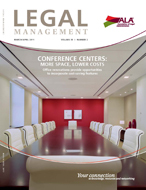 If you’re looking for the latest “buzz” about social media ethics and professional responsibility for lawyers (and their employees), I highly recommend Jay Strother’s article, Just Being Social, published in the March/April edition of Legal Management, a publication of the Association of Legal Administrators. In addition to offering an excellent primer on the issues, the article highlights the responses of legal marketing leaders and attorneys who share some terrific practical tips. This article would be of interest to anyone in law firm management, marketing, and human resources, as well as lawyers generally.
If you’re looking for the latest “buzz” about social media ethics and professional responsibility for lawyers (and their employees), I highly recommend Jay Strother’s article, Just Being Social, published in the March/April edition of Legal Management, a publication of the Association of Legal Administrators. In addition to offering an excellent primer on the issues, the article highlights the responses of legal marketing leaders and attorneys who share some terrific practical tips. This article would be of interest to anyone in law firm management, marketing, and human resources, as well as lawyers generally.
Download PDF ” Just Being Social”
[Disclaimer: I am quoted throughout the article]
Just Being Social | Article Excerpt
THE ABA ETHICS OPINION
As law firms’ use of the Internet evolves well into its second decade, websites’ inherent pitfalls and opportunities for legal organizations have crystallized. Late in 2010, the ABA Standing Committee on Ethics and Professional Responsibility addressed the problems law firm administrators, marketers and ethics attorneys had already wrestled. Formal Opinion 10-457 cites differences between Internet-based business development and its non-electronic predecessors:
- immediacy of access
- direct interaction with legal providers
- disclaimers
- depth of information available
Firm websites are much more than ads. They can be educational tools. They can house very real information. The opinion cites how problems can arise from website marketing and provides guidelines for how to avoid these issues. (Read the complete opinion on the ABA website. An additional resource is ABA’s Ethic SEARCH division. Search the ABA site for “Recent ethics opinion: Lawyer websites” by Peter Geraghty.)
“I can’t imagine why it took the ABA so long to issue this opinion,” [Ross] Fishman said. “The application of old-media ethics rules to the Internet and new media tools has been confounding law firm marketers for a long time. It allowed individual states to create their own conflicting rules and created more confusion than necessary.”
Indeed, some states are ahead of the bar – and their guidelines are even more restrictive, said the director of marketing and business development at Hunton & Williams in Washington, D.C., Kim A. Perret. “There’s a lot of frustration right now and it is going to take some discussion to get the right formula [for restrictions and policies],” said Perret, who is also a former president of the Legal Marketing Association. “Prospective clients want to get the information they need on the web, but protecting the firm from liability or ethical breeches may keep that from happening.” However, Perret thinks that – especially for corporate firms – there exists a sophisticated level of firm website user: They can discern among real information, marketing language and advertising.
But even if some states are more restrictive of web-based marketing and information, those state bar organizations may have the ability to more nimbly react to changes and new media. Many of these entities already had clear website guidelines. Now they are tackling the emerging tools that are causing legal administrators to fret: social media.
THE EXPOSURE
Regardless of their opinions about the timing and usefulness of the formal ABA Opinion, marketers and administrators agree that websites create a lot of gray ethical boundaries – and firms must be ready to address these issues. “This rule said to me that firms have to take every precaution,” said Navarre, who published the book Social.Lawyers: Transforming Business Development. “There is interaction and immediacy inherent in the web. Firm managers must ensure they are filtering the website through layers of protection.”
Websites themselves may be easier to keep under control. The real issues come from the new technologies. Practitioners are creating their own blogs. They are active on Twitter. They have LinkedIn and Facebook accounts that reflect their employer and profession. These media open up new challenges, ones that Navarre said require you to have really honest lawyers who tell the firm how they are using these tools. “Social media: That’s where the line gets a little fuzzy,” she said.
“When we interact online, are we providing legal advice? When someone reads an article online there is a disclaimer.” But Twitter posts and blogs are independent of the firm’s site. Navarre’s solution is to ensure that lawyers and staff know how to handle requests that come in via these media.
-end excerpt-




